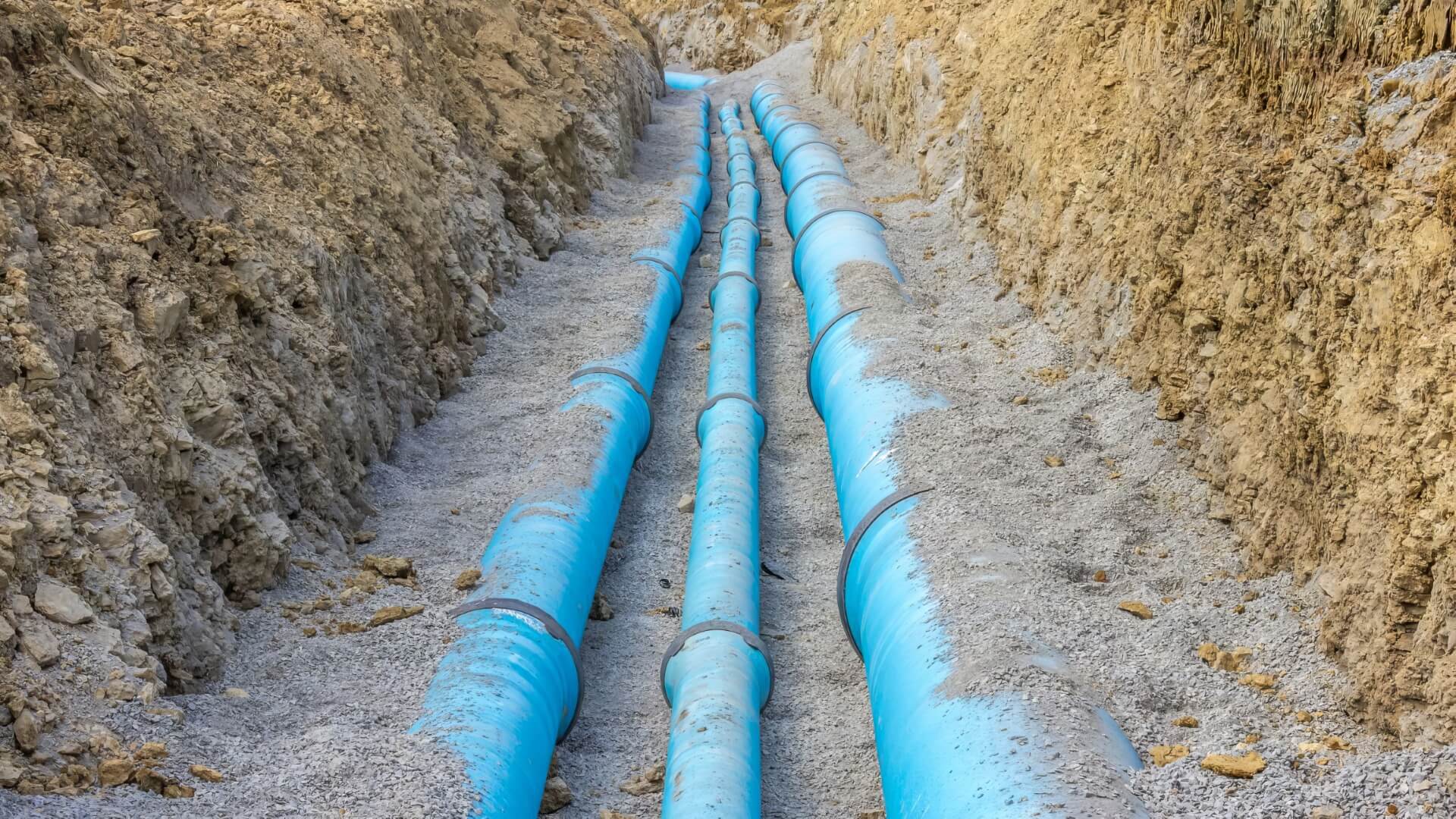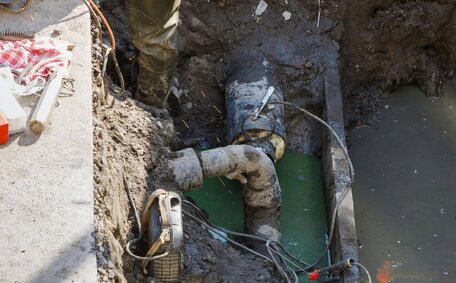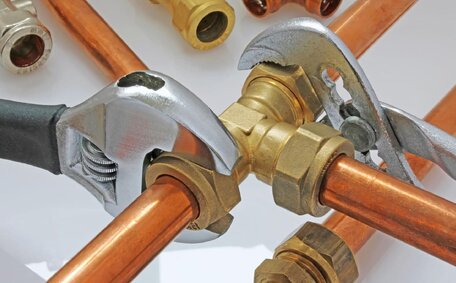Identifying the signs of a blocked drain
There are several key signs indicating a blocked drain in your home, which are important to recognise early to prevent severe blockages:
- Slow or completely stopped water flow down drain areas such as sinks, tubs, showers, and toilets
- Gurgling noises emanating from your drains
- Bad odours wafting from drains inside the house
- Pooling water around floor drains indicating blockages in your drainage system
- Toilets that are slow to refill or continually run
Debris, grease, and various materials frequently lead to pipe blockages. As these accumulate, the pipes narrow and become congested, highlighting the importance of monitoring what goes down your drains. Catching a blockage early can prevent issues from taking hold in the first place, clear them faster, and prevent aggravation into significant drain or pipe damage requiring expensive repairs.
Determining the location of the blockage
Precisely locating a drain blockage streamlines troubleshooting. For instance, flush different toilets to gauge your pipes’ responsiveness; this method helps identify the presence and location of blockages. Check if multiple sinks or tubs drain slowly or produce gurgles; this is one most common way to confirm a wider issue. This process helps to determine how to do unblock the blockage, which is likely found in the main sewer line or a section connecting to it.
The regular trials of common plumbing issues are apparent when signs of a blocked kitchen sink include standing water in the sink basin, foul odours, or very slow drainage.
Vigorously using a plunger for a few minutes can dislodge blockages from grease and oil buildup. If other fixtures drain well, the issue is isolated to the drains pipes under the kitchen sink.
Bathroom sinks often get blocked by hair and soap scum, commonly trapping beneath the sink.
Removing the pipework under sinks provides direct access to address common blockage issues caused by debris. Try snaking the drain and using a drain-clearing chemical. If other bathroom fixtures are unaffected, the blockage is contained well, providing some peace of mind.
Assessing multiple areas where drains can systematically isolate whether the problem stems from a specific fixture’s piping or a blocked drain in your main sewer. The approach aids in identifying potential blockage entry points, pinpointing the targeted areas for repair.
Common household items that cause blockages
Let’s explore common household items that often clog drains:
- Hair - Strands shed during bathing might get tangled, which is how drains get blocked as they cluster into larger clumps down your drains.
- Food waste - Items such as coffee grounds and eggshells often lead to blockages, as they adhere to and build up in drain pipes.
- Paper and sanitary products - Tissues, paper towels, and even items labelled flushable that are not meant to be flushed down toilet pipes can easily jam them.
- Dirt and debris - Excess dirt and leaves that are clogging your drains are common causes blocked drains face, accumulating over time.
These household items find their way into being the main causes of blockages because even small amounts get stuck and do not break down, leading to blocked drainage. To prevent blockages, never dispose of fats or oils down the sink, use drain catchers, and only flush toilet paper.
How tree roots can invade and damage pipes
Tree root invasions pose a sneaky threat to pipes underground or near foundations. As trees mature over many years, roots forge their way down long distances seeking moisture. Even tiny cracks or loose joints in exterior drainage pipes offer an opportunity for roots to wind their way in and clog up your entire system, prompting the question of drains how fix when such issues arise.
Once roots infiltrate the pipes, they expand and can lead to complete blockages, necessitating comprehensive solutions. With clogged drains, slow drainage is a precursor that can indicate the need to fix problem areas before a full clog develops. Roots are among the invaders which can infiltrate pipe joints and jeopardise your property’s piping, eventually causing breaks or collapsed sections.
Strategic landscaping can address one of the underlying reasons clogged drains occur—preventing roots from finding their way towards your pipes.
Avoid planting trees near structures when possible, especially fast-growing varieties with aggressive root systems. Regular drain cleaning by professionals can remove root tendrils, helping prevent clogged pipes that threaten your home. Avoid planting trees near structures when possible, especially fast-growing varieties with aggressive root systems.
Being alert to slowed drainage around gardens helps catch root intrusions early which, if left unchecked, can build up and cause serious damage. Acting swiftly with rooter machines not only salvages the health your pipes but also prevents graver damage over time, circumventing potential major repairs.
The buildup of fats, oils and grease
Substances like fats, oils, or grease that are poured down the kitchen sink can block your pipes and become one of the most common blocked drain culprits. Though they appear harmless when heated, once cooled, these sticky substances solidify within your drain pipes and can turn difficult to resolve without proper intervention. Grease that has been placed down the drain coats the inside of pipes and can cause buildup while trapping food particles and other debris.
Promptly addressing fat residue is crucial due to its sticky consistency and the risk of build-up alongside food scraps and hair. This creates a narrow passage for water, leading to slower drainage. Eventually, the greasy mass completely plugs pipes, preventing any water from draining.
Cooking oil and raw grease often lead to blockages, posing a common problem for homeowners. When not disposed properly, they stick inside pipes. Even products such as those labelled “flushable” are causes of blocked drains, raising the question of how best to manage waste disposal.
Rather than discard, let cooked grease cool and solidify before throwing it in the garbage. Combine drain cleaner tactics with sink strainers to trap food particles. Crucially, avoid pouring fats, oils, or grease down sinks to prevent blockages.
If you detect slow drainage, promptly pour water heated by your water heater down the kitchen sink for several minutes.
Employing this method regularly can protect your entire drain system by liquifying the grease that clogs the pipes, ensuring sinks drain more freely. Use a sink plunger to help dislodge the grease. Calling a professional for preventative drain cleaning maintenance avoids complete clogs.
Accumulation of hair and debris
Hair and small debris passing through bathroom and kitchen drains may culminate in blockages over time. Hair strands frequently snag on the inner walls of sink and shower drains, gathering with other debris. Over time, a matted mass of hair, soap residue, and particles forms, creating the vexing issue of a clogged drain.
Sink strainers are an easy preventive step to catch hair and food scraps. Strainers should be emptied regularly to avoid buildup. Equip your bathroom sinks and bathtubs with drain catchers.
Regularly using drain snakes or enzyme cleaners can prevent major blockages by breaking up debris inside pipes. For households with long-haired occupants, more frequent maintenance helps mitigate lots of loose hair slipping down drains.
Addressing clogs early with professional plumbers can prevent hair and debris from fully obstructing the pipes. Drain cleaning maintenance removes buildup, keeping household drains freely flowing.
Detecting problems with pipe joints or damage
Damaged or faulty pipe joints allow debris and roots into the plumbing system, leading to blockages. Be vigilant for these indicators, often harbingers of a deeper plumbing problem:
- Visible water spots on walls or ceilings
- Unusually wet soil outside along the pipe route
- Higher than normal water bills
- Low water pressure or sudden drops in flow
- Gurgling sounds coming from pipes
If you notice any of these issues, contact West Pennant Hills Plumbing for a thorough inspection of your blocked drains. Our licenced technicians will check pipe joints for tightness and scan drain lines to identify any breaches leading into your plumbing. Based on the problem’s severity, replacing damaged pipe sections or pipe relining could mitigate the damage.
Catching defects early, much like the well-maintained infrastructure of the Gold Coast, prevents major pipe damage and failures down the track. Our preventative maintenance not only removes roots and grease but also prevents them from completely obstructing the water flow or damaging the pipes. Contact West Pennant Hills Plumbing to schedule professional drain evaluations keeping your plumbing system clear and functional.
Using plungers and drain snakes to clear minor clogs
Plungers and drain snakes are effective at clearing minor obstructions without the need for professional assistance. Follow these steps to safely attempt clearing minor clogs yourself:
- Fill the sink with water to aid the plunger in moving the clog with water pressure. Apply a sink plunger securely over the drain, and vigorously plunge 15-20 times in a row. Repeat until the sink drains fully.
- For your toilet, ensure no bowl cleaners are in the water before plunging. A strong effort with a flanged toilet plunger to form a tight seal over the drain opening will work effectively to remove blockage caused by simple household clogs. Plunge forcefully to loosen the mass inside.
- Feed a drain snake down your pipes to extract hair, debris, or foreign objects that could clog them, like children’s toys. Rotate grabbing hooks at blockage points. Limit use in toilets to avoid scratching porcelain.
- Always run hot water down drains during and after plunging or snaking to rinse away dislodged grime. This helps prevent re-settling.
Avoid using too much force or causing scratches, which could damage the pipes. Check out your pipes occasionally for signs of wear. Seek the help of professional plumbers if your DIY efforts take too long to improve drainage or if you’re facing frequent and severe blockages.
When to call a professional plumber
There are certain plumbing predicaments when expert assistance is essential for proper diagnosis and repair. Although DIY methods can clear minor clogs, severe blockages often necessitate the expertise of a professional plumber.
Contact West Pennant Hills Plumbing for urgent assistance with blocked drains and insights on how to fix them swiftly:
- Multiple drains in your home are completely backed up with no drainage at all
- You have recurring clogs that resist at-home plunging or snaking efforts
- Your main sewer line is blocked, affecting the entire household system
- Outdoor drainage pipes are obstructed by invasive tree roots
Here we utilise advanced equipment that can apply sophisticated techniques to tackle persistent blockages in an outside drain, demonstrating how to fix issues beyond the capabilities of most homeowners. We determine the underlying issue and take corrective action to restore proper water flow for all your blocked drain needs.
West Pennant Hills Plumbing also assists with:
- Repairing damaged drain pipes and pipe joints allowing debris intrusion
- Resolving burst pipes that cause blocked drainage, severe leaks, or flow issues indicating pipe deterioration
- Inspecting and servicing pipes to prevent hazardous sewer gas accumulation
For suspected major blockages or plumbing emergencies, email [email protected], book online, or call 1300 349 338 for a licensed professional’s help. We’re available 24/7 to quickly respond and restore proper drainage before extensive flooding or property damage occurs.
Proactive measures to prevent future drain blocks
We suggest proactive measures to help prevent future drain clogs. Adopt these measures to maintain free-flowing household drains:
- Installing sink strainers can effectively prevent kitchen and bathroom drain blockages.
- Regular use of drain snakes and enzyme cleaners can dissolve grease buildups and keep drains clear.
- Pour hot water mixed with baking soda and vinegar down drains, an excellent how-to for degreasing pipes
- Maintain your focus on ensuring only toilet paper and human waste are washed down drain channels in toilets to avoid clogs
- Make sure to have a water softener system installed if you’re grappling with hard water issues
- Trim back trees/plants near drainage pipes to retard invasive root growth
- Schedule annual drain cleaning maintenance by West Pennant Hills Plumbing experts
Implementing these simple practises keeps plumbing drainage clear over the long term. As trusted industry veterans since 2000, we can also evaluate your drainage pipes for damage allowing debris intrusion. Contact West Pennant Hills Plumbing to prevent costly emergency clogs in future.






